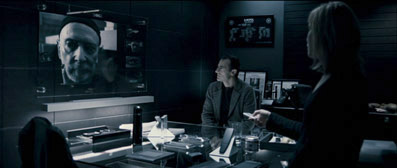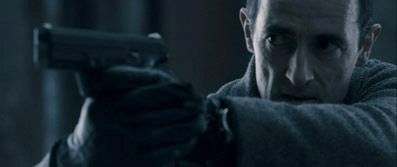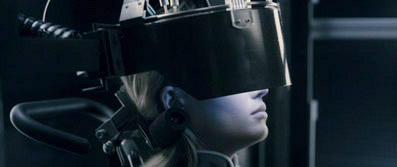|
It occurred to me more than once whilst watching Chrysalis, the debut feature from director Julien Leclercq, that one of the reasons Blade Runner has weathered the passing of time so well is that its vision of a dystopian future is one born largely from the by-products of the current corporate world. The block-high video commercials and droning advertising blimps are as grimly intrusive as the waste fumes of industry and the overcrowded streets and skyways. It's a vision that endures precisely because it is a recognisable extension of our present urban existence, one in which the landscape is ever-increasingly cluttered with the debris of commerce.
Chrysalis, like a fair few other dark visions of the future, is stripped of such décor in favour of a grimly minimalist industrial complex of featureless grey and black walls, with even objects that personalise offices and apartments seemingly selected in part so that they will not to disrupt the gloom. Of course, the purpose is clear, to provide a visual reflection of the depersonalised coldness of the society in which the film is set, an expressionistic approach that here extends into a world stripped of colour and a lead character who is effectively emotionally blank. It's a world where you can't imagine anyone even acknowledging a birthday let alone celebrating one, where doing your job efficiently is the only real reward that life has to offer.

In this grim Paris of the future, two parallel stories unfold. Hard-nosed cop David Hoffman (Albert Dupontel) sees his partner and lover Sarah killed by Bulgarian black-marketer Dimitri Nicolov (Alain Figlarz), and is subsequently partnered with the rookie cop Marie Becker (Marie Guillard) to hunt Nicolov down. At the same time top surgeon Professor Brügen (Marthe Keller) is preoccupied with physically and mentally reconstructing her daughter Manon (Mélanie Thierry) following a car accident that left her with serious injuries. It's a process that involves regular exposure to a memory retrieval device known Chrysalis, which was stolen and secretly supplied to her by – wouldn't you know it – Dimitri Nicolov.
David's investigation uncovers a trade in people trafficking and disparate victims who are linked by mysterious scars on their eyelids. He tracks Nicolov down with a trademark technique involving stony-faced brutality and questions of few words, only to have the case inexplicably handed over to Marie. Her inexperience is quickly exposed when she interrupts David's typically fist-led questioning of Nicolov and is taken hostage by their prisoner, whom David subsequently kills, an action that sees him asked for his badge and gun. But all here is not what it seems.
OK, let's pause and back-track a bit. In the accompanying making-of featurette, director Leclercq emphasises the importance of the look of the film, and it's this aspect that has been at the core of the majority of its more positive reviews. Chrysalis is, without doubt, a visually impressive work, but as someone who has repeatedly railed against Hollywood's focus on surface gloss over content in the past, I'm not about to go all forgiving when French cinema does likewise.
If you can hop past the borrowings from previous genre movies (start with A Clockwork Orange, Total Recall and Eyes Without a Face and go from there) and the familiar mismatch pairing of hard-nosed but emotionally damaged cop with green-gilled rookie, then you may be ready to take on the plausibility hiccups the film falls victim to on its journey between set-pieces. The attempted arrest of Nicolov is a case in point. Having identified the factory warehouse where his nemesis is likely to appear, the experienced David parks his car in open view and makes no attempt to conceal himself when approaching his prey. You have to assume that the only reason Nicolov did not make a quicker break for it is that he knew all along that he could disarm this desperate cop with a crash helmet if he just got near enough. Mind you, Marie is not much help, as once they have their man in custody she all but hands him the gun he needs to take her hostage. Inexperienced she may be, but we can presume that in the future the police will still receive some sort of training and common sense guidance.

Then again, Nicolov himself, the subject of the film's most initially baffling identity mix-up, proves somewhat less deadly than we've been lead to believe. After he makes an almost magical appearance in David's bathroom, he decides that the best way to kill him would not be with a gun or a knife, but to engage in a martial arts battle with a man of compatible fighting skills and thus risk the chance that he might lose. It's an excuse, of course, for Leclercq to stage a furiously choreographed close-quarters punch-up, but it just doesn't make much narrative sense, and the fact that we've been shown David practicing holding his breath underwater just before the fight does tend to heavily telegraph the conflict's conclusion.
The film does touch on a number of familiar but still interesting sf concepts – the nature the identity in an age when memory and experience can be erased or transplanted is fine science fiction meat – but unfortunately elects not to explore them in any detail. By the midway point, it feels less like a science fiction thriller than a criminal conspiracy story whose most potent futuristic element is its technology, which is at it's most persuasive when at its use is offhand (the interactive desk that has since made it to the real world in the shape of Microsoft's big screen 'Surface' computers).* The holographic surgery, however, for all its visual elegance, plays a bit too much like a concert performance, accentuated by its on-screen presentation and length of the showpiece scene in which it appears.
Never boring and always good looking, Chrysalis has certainly struck a chord with some genre fans and attracted its share of favourable reviews. There's no doubt that director Leclercq has an eye for imagery and knows how to stage an action scene, but given that there are four writers credited here you'd expect the characters to have just a little depth and there to be a bit more narrative cohesion and complexity. An intriguing if not fully satisfying first film, it will be interesting to see where Leclercq goes next.
This is probably as close to monochrome as any colour-shot film you'll see all year, almost the only colour intruding into this almost black-and-white world being a steely blue. Although a look that has become tiresomely popular with the makers of TV thrillers in recent years, it is taken close to its extreme here and adds to the sense of a future Paris that has become cold and soulless. The 2.35:1 anamorphic transfer copes very well with this aesthetic, boasting fine contrast and (important this) shadow detail, and a pleasing and non-enhanced level of sharpness.

A very nice 5.1 French surround track has the clarity and range you'd expect from a modern movie of even moderate budget. It's also very well mixed – the early subterranian shoot-out in particular makes neat use of the surrounds to place you squarely in the centre of the action. The hums of the Chrysalis machine give the subwoofer a serious workout, so don't put anything fragile on top of it before running the movie.
The English subtitles are clear but fixed.
Making-of (25:58)
A standard look behind the scenes laced with interviews with cast and crew, worth catching for its technical details (the staging of fights, the use of the 'spider cam', the production design and effects) and for the director's intentions and approach. Hearing cast members talk about their characters is interesting, given how little of this comes through in the film itself, and you'll find plenty of talk of the importance of the film's look.
Trailer (1:15)
The English trailer that sells the film as a futuristic actioner but has a few too many giveaways for my liking.
Chrysalis is one of a number of films that collectively could constitute a new action cinema du look, works whose surface sheen and scene staging rival those of the slickest American product but whose content and characterisations are as lacking in depth. Their European viewpoint and relative rarity in a sea still dominated by Hollywood still makes them stand out from the crowd, but only just. Leclercq's eye for composition is definitely the film's key strength – whether that's enough really will rest in the eye of the beholder.
|